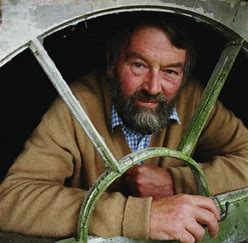The Ebony Tower
‘The only writer in English who has the power, range, knowledge, and wisdom of Tolstoy or James’, according to John Gardner. Whether you agree or not, it’s hard to think o f a more prodigiously talented, or more thought-provoking, contemporary fiction writer in English than John Fowles. Having just re-read (for the third time?) his collection of novellas, The Ebony Tower, and having found it masterful yet again, I thought I might say something about the title novella, which for me is the standout piece, and one of Fowles’ best works.
f a more prodigiously talented, or more thought-provoking, contemporary fiction writer in English than John Fowles. Having just re-read (for the third time?) his collection of novellas, The Ebony Tower, and having found it masterful yet again, I thought I might say something about the title novella, which for me is the standout piece, and one of Fowles’ best works.
The action takes place in Brittany—a Celtic land, significantly in view of the fact that the novellas are all, in Fowles’ view, variations on a Celtic theme. A young, successful abstract painter, David Williams, goes to interview a much older, even more successful one, in his manor house, where he lives with two ‘nymphs’, young Englishwomen in their twenties, both artists of a kind. Breasley, the older artist, is famously difficult, and attacks not only Picasso, but all abstract painters, whom he regards as lacking balls. He’s inarticulate, gets offensively drunk, and his words have to be interpreted—translated, almost—by the Mouse, the more intelligent and gifted of his acolytes. David, who is happily married, finds himself strongly attracted to Diana, the Mouse. (Her nickname, given her by Breasley, means ‘muse’ with an ‘o’ in it to suggest a vagina.) He wishes to believe that only the other young woman offers sexual favours to the septuagenarian Breasley, but it becomes apparent that this is not the case. Breasley even engineers a tableau vivant of Manet’s Dejeuner Sur L’Herbe. In short, Fowles has done everything in his power to make us dislike Breasley, and sympathise with Williams, who is sensitive, courteous, and respectful.
This is where the story gets really interesting. As the men argue about art—insultingly on Breasley’s side, in cool rational terms on Williams’—it becomes clear that what is at stake is not only the great debate of twentieth century art, but what makes an artist. In fact, are artists kind and selfless, as we would all wish (perhaps), or are they, on the contrary, completely selfish tyrants who care only about their art? Are both paths possible? And what role, if any, does love play in the life of an artist?
Some philistines who have reviewed this book have complained about the ‘pretentious’ dialogue. It’s not pretentious, merely educated, and realistic, for the characters. Other reviewers have been shocked by the character of Breasley, who is certainly an abusive old man. But that’s the point. Fowles is exploring the dichotomy between man and artist—one that is vital to understand in this MeToo era. And lest one assume that Breasley’s views are also Fowles’, it’s worth noting that the character of the Mouse is rich, complex, and assertive, as indeed Fowles’ female characters are in general. Fowles held critics in open contempt, so perhaps he would disapprove of this review too. My only excuse for writing it, then, is not to elucidate the novella, or interpret it, but merely to urge those writers who have not yet read it to do so. It’s the perfect introduction to Fowles’ fiction. And once you have read that, move on to the novels, especially The Collector, The Magus, The French Lieutenant’s Woman, and The Maggot. (Fowles is second to none, even Hillary Mantel, as a writer of historical fiction, by the way.)
Fowles may be out of fashion, as many white males are, but in his case, it’s unjustified. The Ebony Tower is a masterpiece of the novella form that will have you thinking uncomfortable thoughts, probably, about your own work and the relation of your life to it.
Garry Craig Powell
Garry Craig Powell, until 2017 professor of Creative Writing at the University of Central Arkansas, was educated at the universities of Cambridge, Durham, and Arizona. Living in the Persian Gulf and teaching on the women’s campus of the National University of the United Arab Emirates inspired him to write his story collection, Stoning the Devil (Skylight Press, 2012), which was longlisted for the Frank O’Connor International Short Story Award and the Edge Hill Short Story Prize. His short fiction has appeared in Best American Mystery Stories 2009, McSweeney’s, Nimrod, New Orleans Review, and other literary magazines. Powell lives in northern Portugal and writes full-time. His novel, Our Parent Who Art in Heaven, was published by Flame Books in 2022, and is available from their website, Amazon, and all good bookshops.
- Web |
- More Posts(79)